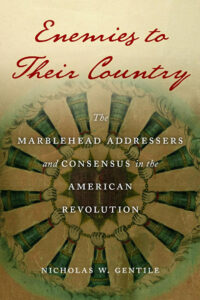BOOK REVIEW: Enemies to Their Country: The Marblehead Addressers and Consensus in the American Revolution by Nicholas W. Gentile. (Amherst and Boston, MA: University of Massachusetts Press, 2025) Paperback, $32.95.
The first book by independent historian Nicholas W. Gentile brings to light an almost completely unknown incident that occurred in the coastal town of Marblehead, Massachusetts, during the tense days before the outbreak of war at Lexington and Concord on April 19. 1775. Enemies to Their Country: The Marblehead Addressers and Consensus in the American Revolution demonstrates how one letter can threaten the peace and harmony of a community and can lead to social ostracism and exile.
 Marblehead was an important fishing community, with an aristocracy created by the cod fishing industry. It was also important as a ship-building center. General George Washington and his forces relied on Marblehead sailors and boats to escape disaster in Brooklyn in August 1776 and then to cross the Delaware prior to the attack on Trenton that December. Before these contributions to the Patriot (or “Whig”) cause, the town’s harmony was threatened by the signatures of thirty-three residents to a letter published in the Essex Gazette in May 1774. The letter was a “send-off” to departing governor Thomas Hutchinson, who had been replaced by the British general Thomas Gage after the commotion created by the destruction of tea in December 1773. The thirty-three residents who added their names to the letter were hoping that Hutchinson would return to London and try to use his influence to calm the situation. The letter thanked Hutchinson for his involvement on behalf of the fishing industry, and then ended on a conciliatory note: “’We heartily wish you, Sir, a safe and prosperous Passage to Great-Britain, and when you arrive there may you find such a Reception, as shall fully compensate for all the Insults and Indignities which have been offered you.’”
Marblehead was an important fishing community, with an aristocracy created by the cod fishing industry. It was also important as a ship-building center. General George Washington and his forces relied on Marblehead sailors and boats to escape disaster in Brooklyn in August 1776 and then to cross the Delaware prior to the attack on Trenton that December. Before these contributions to the Patriot (or “Whig”) cause, the town’s harmony was threatened by the signatures of thirty-three residents to a letter published in the Essex Gazette in May 1774. The letter was a “send-off” to departing governor Thomas Hutchinson, who had been replaced by the British general Thomas Gage after the commotion created by the destruction of tea in December 1773. The thirty-three residents who added their names to the letter were hoping that Hutchinson would return to London and try to use his influence to calm the situation. The letter thanked Hutchinson for his involvement on behalf of the fishing industry, and then ended on a conciliatory note: “’We heartily wish you, Sir, a safe and prosperous Passage to Great-Britain, and when you arrive there may you find such a Reception, as shall fully compensate for all the Insults and Indignities which have been offered you.’”
The idea of apologizing to a man like Hutchinson was anathema to many who subscribed to the Patriot cause (which, at this point, meant a return to no taxation and stopping the abridgement of British liberties). Most of the Marblehead residents considered themselves Whigs and were incensed at the letter. Gentile describes the importance of everyone in the community at that time in history being on the same page. Giving up one’s individual needs for the common good helped to create social harmony. Obviously this belief is difficult to grasp and practice today, but community survival in eighteenth-century Massachusetts was based on such harmony. The men who signed the letter to Hutchinson, now known as the “Addressers,” threatened Marblehead.
The book then focuses on the effects of the letter on the Addressers. Most Addressers ended up offering recantations, and some then took active roles in fighting on the Patriot side after war broke out. Some Addressers were truly contrite and regretted signing the letter, claiming that they did not truly understand Hutchinson’s character. Other Addressers took a longer time to recant, which some did more than once since their first attempts were not accepted by the community. All Addressers did recant at some point, but some of them could not reconcile their politics for the good of the community. Chapter 10, “The Exile of Benjamin Marston,” is a fascinating account of one of the Addressers who kept a diary and recorded everything that happened to him during the Revolution. He ended up becoming a Loyalist, and was imprisoned several times for his beliefs. His story demonstrated that choosing sides was never a simple decision. Events were in constant motion and the future was uncertain. Many people logically chose to support what was the obvious choice: the better-equipped, better-trained, more experienced British.
Enemies to Their Country is an excellent example of how viewing local events can help one understand those on the national level. Gentile remained entirely focused on his narrative of Marblehead, just one community trying to exist in a very dangerous time, when something as simple as a letter became a threat. How many other cities and towns in Massachusetts, or other colonies, wrestled with similar situations?
PLEASE CONSIDER PURCHASING THIS BOOK FROM AMAZON IN PAPERBACK OR KINDLE.
(As an Amazon Associate, JAR earns from qualifying purchases. This helps toward providing our content free of charge.)






Recent Articles
The Killing of Jane McCrea
The American Princeps Civitatis: Precedent and Protocol in the Washingtonian Republic
Thomas Nelson of Yorktown, Virginia
Recent Comments
"Decoding Connecticut Militia 1739-1783"
Hi, I'm looking for discussion in the records for troop movement and...
"General Israel Putnam: Reputation..."
Gene, see John Bell’s exhaustive Analysis, “Who Said ‘Don’t Fire Till You...
"The Deadliest Seconds of..."
Ed, yes Matlack's son was reportedly a midshipman on the Randolph. That...